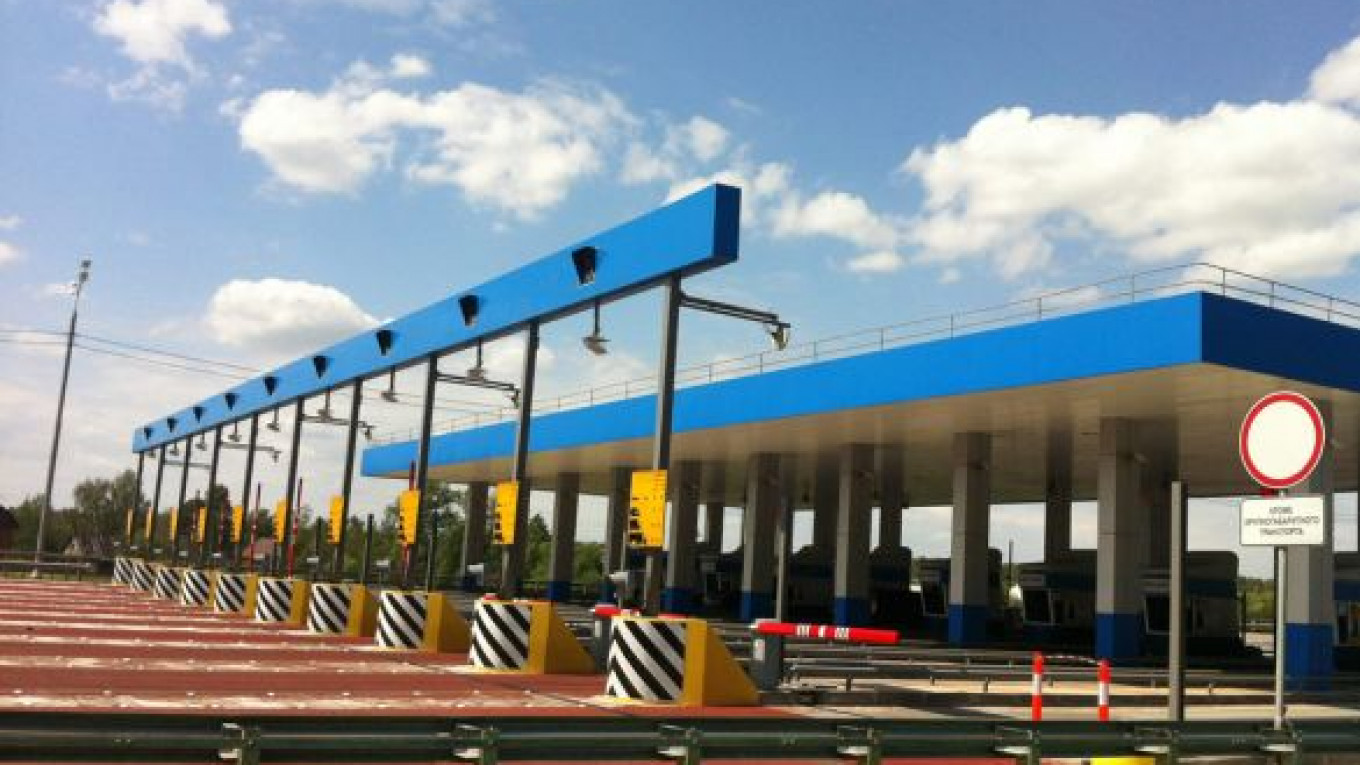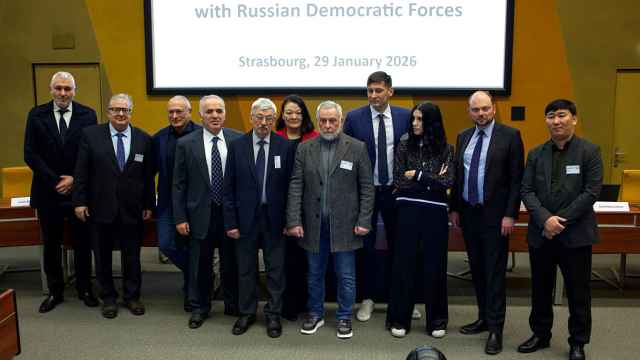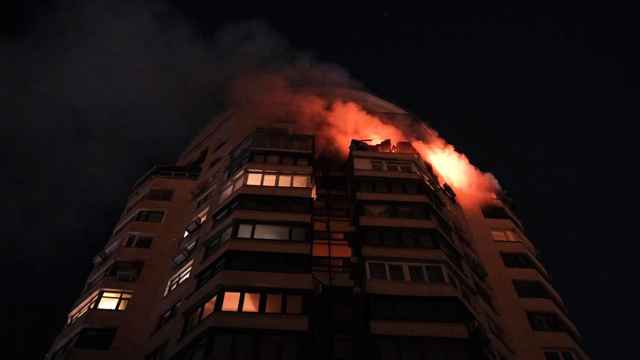Download the higher resolution version of the map here (639 Kb)
A recent announcement by Federal Highway Agency Rosavtodor that more than a half of all main thoroughfares in Russia are substandard and almost a third are overloaded was a polite echo of the chorus of complaints by everyone who drives in this country.
But motorists will soon get the chance to put their money where their mouths are.
Privately-built and operated toll roads are set to crisscross central Russia in an attempt to improve the situation.
One toll road, currently being built in several stages, is the M11 Moscow-St. Petersburg highway.
At the end of May, public hearings were held on tender documentation to build and operate a segment from the 543rd to 684th kilometer of the M11 highway, starting near Veliky Novgorod and linking with St. Petersburg at the northern capital’s beltway.
The estimated cost to complete this segment is more than 89 billion rubles ($2.8 billion), with the state providing 75 percent of the funds and the rest meant to come from private investors, according to the preliminary information provided by Russian Highways, also known as Avtodor, the state company managing the construction of toll roads in the country.
In Search of Partners
Although not disclosing the names of the companies that have shown interest in the project, Russian Highways said in a statement that more than 70 representatives of local and international law firms, consulting, construction and financial companies were present at the hearing.
“The 138-kilometer section of the M11 road entering St. Petersburg could be interesting for potential investors because it has a daily traffic volume of 30,000 to 35,000 cars and a high return rate on investment — higher than similar infrastructure projects in Brazil for instance,” said Russian Highways chairman Sergei Kelbakh, in an interview prior to the public hearing.
The basis for public private partnership will be a concession agreement. Having won the tender, the concessionaire gets to build the road using a mix of its own and state funds and is also responsible for highway maintenance during the lifetime of the concession, which is 27 years. After that, the road will be transferred to state ownership.
The concessionaire gets the right to collect tolls on behalf of Russian Highways from drivers using the road. It transfers the money to the state company and in return will be reimbursed for expenses incurred, like servicing of loans for construction, taking into account the returns on the invested equity and loan capital as well as operational costs.
Moreover, the concessionaire will get bonuses for incremental toll revenue and be fined for violations of road-quality standards.
Tender documents are now being prepared based on the results of the hearings. “Several changes were proposed, and many will be considered by Russian Highways, the tender organizer,” the state company said in the statement.
The tender is to be announced in the upcoming days, and the agreement with the winner is to be signed in July 2014.
One of the most important criteria for choosing the winner will the amount of initial state funding that concessionaires require to begin construction, as well as the value of subsequent payments.
The works on the M11 section are to begin in 2015 and to end in 2017, with the road slated to welcome its first paying drivers a year later.
Toll Charge Ahead
Using concession contracts as a primary tool to draw private investments into highway construction projects is a new trend in Russia, as are toll roads themselves.
Russian Highways was founded in 2009 for the purpose of creating a network of toll roads in the country. In July of the same year, a pioneer concession agreement was signed with the Glavnaya Doroga consortium to build and operate an 18.5-kilometer toll road going from the MKAD, around Odintsovo and then linking to the M1 Belarus highway. It is nearly complete, and tolls will be collected starting in the fall of this year. Drivers will pay about 5 rubles per kilometer traveled.
A second concession agreement was signed soon after between Russian Highways and the North-West Concession Company — partly owned by the country’s largest bridge builder, Mostotrest, and French infrastructure company Vinci Group — for the construction and maintenance of the 15th to 58th kilometer stretch of the M11 Moscow-St. Petersburg highway going from the Businovskaya junction with the MKAD to Solnechnogorsk. The road is to be completed next year. Tolls will be charged starting from fall 2014.
Another major infrastructure project designed to off-load a considerable amount of traffic from the MKAD and federal radial roads is the Central Ring Road: a four to eight lane superhighway partly to be built anew and partly to use existing sections of the A107 Small Moscow Ring Road, roughly 30 kilometers beyond the MKAD, and the Big Moscow Ring Road (A108), which is about another 30 kilometers farther out.
This tollway, with a 530-kilometer circumference, is to be built in five stages. The first three sections, the M4 Don connecting to M1 Belarus and then going to the M11 and to the M7 Volga, are to be completed by 2019.
The only toll road now operating in the Moscow region is a 23-kilometer stretch on the 48th to 71st kilometer of M4 Don highway that runs parallel to Kashirskoye Shosse, to the south of the capital. Fees have been levied there since last October. Car drivers have to pay 30 rubles during the day and 10 rubles at night, while medium trucks and buses pay 20 and 60 rubles, respectively. The charge for heavier trucks is 40 to 120 rubles.
When the segment opened to traffic, cars waiting to pay at tollbooths formed lines stretching up to several kilometers during rush hours. Drivers waiting in line said they did not mind the fees but were put off by having to wait.
Since then, the situation has improved. Russian Highways has put up more tollgates and introduced a system of electronic payment that reduces traffic jams. A transponder attached to the car’s windshield allows the fee to be automatically deducted from the driver’s account as he approaches the semaphore gate at 10 kilometers per hour or less. These electronic passes can be purchased at tollbooths or ordered via the Internet.
“Now the overall number of electronic payment devices has surpassed 14,000. In peak hours, the share of drivers using them goes up to 20 percent and more people are turning to them,” said Polina Pichkur, a spokeswoman for Russian Highways.
Legal Issues
With the adoption in April last year of new legislation on concessions, which brought Russian law into compliance with international practices, infrastructure projects are becoming more attractive to private investors.
The previous edition of the law did not allow the contracting parties — neither the state nor the investor — to hold any negotiations on the draft concession agreement, which is common practice in the West.
The new legislation also makes it possible to choose between various types of concessions, use international best practices and not just be stuck with a standard government-issued format, as was required before.
“A positive aspect of using concessions in general in projects to build toll roads is that the concessionaire has to pay his own share. Besides taking on a part of the risk for the project the investor is then responsible for road maintenance and levying fees,” said Pavel Karpunin, a partner of Capital Legal Services.
The situation is changing for the better, but Russian Highways is not satisfied with the rate of progress.
“In our opinion, the changes should be a lot more dynamic,” said Russian Highways chief Kelbakh. “For instance, take the laws on property expropriation: Here, the legislation is still far from perfect. In the U.S., when an infrastructure project is underway, the land for it is cleared first, and the owner is paid in full, but afterward.”
The government has to develop clear and fixed rules of the game — a set of laws that would work and minimize the risks of the investor, he added.
Moreover, the state should provide long-term financial guarantees. “Not for the extent of three years of federal budget planning, but for the whole 25 years of concession project life cycle, because the companies that come here sign agreements for that period. And the rate of return on investment has to be fixed on paper,” Kelbakh said.
| Road Name | Segment Location | Toll charging starts/ road completion date |
| Toll roads | ||
| M1 Belarus, west to Minsk | 33rd to 132nd kilometer | Toll charged from 2015 |
| M3 Ukraine, south to Kiev | 37th to 82nd kilometer | Toll charged from 2015 |
| M4 Don, southwest to Rostov-On-Don | 48th to 71st kilometer; plans to extend to 117th kilometer by 2015 | Toll charged on 48th to 71st kilometer from 2012 |
| M11 Moscow-St. Petersburg | 15th to 58th kilomter; then 58th to 90th kilometer | 15-58 section to open late 2014 |
| Odintsovo bypass, west of Moscow | Molodogvardeiskaya Ulitsa to M1 | Toll charged from late 2013 |
| Balashikha and Noginsk bypasses | Zheleznodorozhny-CRR | To be completed 2016-2019 |
| Central Ring Road, Moscow Region | M4-M1 section | Completion by 2019 |
| The first three sections | M1-M11 section | |
| M11-M7 Volga section | ||
| Major new and reconstruction of non toll roads | ||
| M9 Baltiya, west to Riga | MKAD to 50th kilometer of Novorizhskoye Shosse | Completion in 2015 |
| M5 Ural, southeast to Ryazan | A107 - connection to Novoryazanskoye Shosse at Ulyanino | Completion in 2013 |
| Dmitrov bypass road | A104 to A108 bypass going around Dmitrov | Completion in 2013 |
| Orekhovo-Zuevo bypass road | M7 to A108 bypass going around Orekhovo-Zuevo | Completion in 2013 |
| A105 road junction to Kashirskoye Shosse | 43rd kilometer of A105 road heading to Domodedovo airport | Completion in 2015 |
Contact the author at [email protected]
A Message from The Moscow Times:
Dear readers,
We are facing unprecedented challenges. Russia's Prosecutor General's Office has designated The Moscow Times as an "undesirable" organization, criminalizing our work and putting our staff at risk of prosecution. This follows our earlier unjust labeling as a "foreign agent."
These actions are direct attempts to silence independent journalism in Russia. The authorities claim our work "discredits the decisions of the Russian leadership." We see things differently: we strive to provide accurate, unbiased reporting on Russia.
We, the journalists of The Moscow Times, refuse to be silenced. But to continue our work, we need your help.
Your support, no matter how small, makes a world of difference. If you can, please support us monthly starting from just $2. It's quick to set up, and every contribution makes a significant impact.
By supporting The Moscow Times, you're defending open, independent journalism in the face of repression. Thank you for standing with us.
Remind me later.






